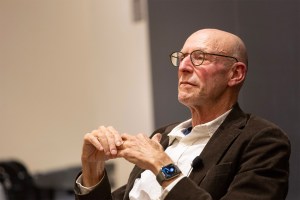Health
-

How realistic is ‘The Pitt’?
Doctors weigh in on what hit TV show gets right and wrong about life in the ER — from pacing and caseloads to workplace culture (and that waiting room from hell)
-

Yoga can help cut severe, initial opioid-withdrawal period in half, study finds
Researchers say results could dramatically increase chances of recovery
-

6 keys to a long, healthy life (ice cream included)
Also, why reading Ben Franklin beats climbing Mount Everest
-

Six cancers rising faster in younger adults than older ones
Large new global study fuels growing concern over trend of increases in several types

-

What’s next for GLP-1s?
Scientists eye new treatment targets for popular weight-loss drugs, from heart failure to addiction
-

Drinking 2-3 cups of coffee a day tied to lower dementia risk
Caffeinated tea also found to slow cognitive decline in study

-
Research in brief
BLACKS, HISPANICS LESS LIKELY TO GET FOLLOW-UP RADIATION THERAPY, BLACKS MORE LIKELY TO CHOOSE AGGRESSIVE CARE AT END OF LIFE
-
Aquatic genome captures foreign DNA
Long viewed as straitlaced spinsters, sexless freshwater invertebrate animals known as bdelloid rotifers may actually be far more promiscuous than anyone had imagined: Scientists at Harvard University have found that the genomes of these common creatures are chock-full of DNA from plants, fungi, bacteria, and animals.
-
Protective mechanism fails when obesity sets in
Reporting in the journal Cell Metabolism, researchers from the Harvard School of Public Health (HSPH) said they have shown for the first time that fat-storing cells, or adipocytes, contain a protective anti-inflammatory immune mechanism that prevents the cells from overreacting to inflammation-causing stimuli, such as fatty acids in the diet.
-
Cluzel named professor of molecular and cellular biology, applied physics
Philippe Cluzel has been appointed professor of molecular and cellular biology and Gordon McKay Professor of Applied Physics in Harvard University’s Faculty of Arts and Sciences (FAS) and School of Engineering and Applied Sciences, effective July 1.
-
New report finds low vitamin D levels appear common in ‘healthy’ children
Many infants and toddlers may have low levels of vitamin D, and about one-third of those appear to have some evidence of reduced bone mineral content on X-rays, according to a report in the June issue of Archives of Pediatrics & Adolescent Medicine, one of the JAMA/Archives journals.
-
Video game technology may help surgeons
In a study funded by the National Institutes of Health (NIH) featured on the cover of this month’s Journal of Thoracic and Cardiovascular Surgery, cardiac surgeons from Children’s Hospital Boston report good results with a simple technology borrowed from the gaming industry: stereo glasses.
-
Decline in cigarette smoking in U.S. significantly offset by increase in other tobacco products
While trends in cigarette smoking and sales have declined in the U.S. for the past decade, sales of non-cigarette tobacco products have been on the rise. Researchers from the Harvard…
-
Video game technology may help surgeons operate on beating hearts
Surgery has been done inside some adults’ hearts while the heart is still beating, avoiding the need to open the chest, stop the heart and put patients on cardiopulmonary bypass.…
-
HSPH student takes aim at AIDS with statistics
Bethany Hedt has always been in love with numbers. Her challenge has been finding a way to feed that love while fulfilling an equally strong drive to help the people around her.
-
John Passanese eyes the alternatives
Yoga is a popular activity for many Harvard undergraduates looking to stay fit or reduce stress. For John Passanese, a Lowell House senior, yoga has additional importance — it can be an excellent tool for managing chronic pain. For more than 20 years, Passanese’s mother has suffered from multiple sclerosis (MS), a neurodegenerative disease that attacks the body’s central nervous system. MS can cause a range of debilitating symptoms, including cognitive disabilities, paralysis, loss of vision, and chronic pain. There is no known cure.
-
NIH awards HMS $117.5M, five-year grant for patient-centered research
The National Institutes of Health (NIH) has announced that Harvard Medical School (HMS) will receive $117.5 million over the next five years for the establishment of a Clinical and Translational Science Center (CTSC) that will transform patient-oriented, laboratory-to-bedside research at HMS and its affiliated hospitals.
-
Study identifies food-related clock in brain
n investigating the intricacies of the body’s biological rhythms, scientists at Beth Israel Deaconess Medical Center (BIDMC) have discovered the existence of a “food-related clock,” which can supersede the “light-based” master clock that serves as the body’s primary timekeeper.
-
NIH awards Harvard Medical School $117.5 million, five-year grant for patient-centered research
The National Institutes of Health today announced that Harvard Medical School (HMS) will receive $117.5 million over the next five years for the establishment of a Clinical and Translational Science…
-
Experiment advances cell reprogramming understanding
The announcement last year by scientists in Japan, at the Harvard Stem Cell Institute (HSCI), and at the Whitehead Institute that they had each — independently — coaxed adult cells into reverting to an embryonic stem cell-like state was arguably the biggest news in developmental biology since the cloning of Dolly the ewe.
-
Intestinal bacteria promote and prevent inflammatory bowel disease
Scientists search for drug candidates in some very unlikely places. Not only do they churn out synthetic compounds in industrial-scale laboratories, but they also scour coral reefs and scrape tree bark in the hope of stumbling upon an unsuspecting molecule that just might turn into next year’s big block buster. But one region that scientists have not been searching is their guts. Literally.
-
Genomic analysis gives new insights into cellular reprogramming
A cross-disciplinary team of Harvard University, Whitehead Institute, and Broad Institute researchers has uncovered significant new information about the molecular changes that underlie the process by which adult cells can…
-
Recent longitudinal study: Smoking is addictive, quitting is contagious
Over the past 30 years, the number of smokers in the United States has steadily decreased — a tribute to the efforts of public-health workers everywhere. And while this fact is indisputable, less obvious are the social and cultural forces that lead an individual to kick the habit.
-
Experiment advances understanding of cell reprogramming
The announcement last year by scientists in Japan, at the Harvard Stem Cell Institute (HSCI), and at the Whitehead Institute that they had each — independently — coaxed adult cells…
-
Beth Israel Deaconess Medical Center joins forces with Google Health
Beth Israel Deaconess Medical Center (BIDMC) is expanding options for users of its secure PatientSite portal by joining forces with Google to offer a new way to safely exchange medical…
-
Smoking is addictive but quitting is contagious
Over the last 30 years, the number of smokers in the U.S. has steadily decreased—a tribute to the efforts of public-health workers everywhere. And while this fact is unarguable, less…
-
Prostate cancer treatments are contrasted
Jim Hu and colleagues at Harvard-affiliated Brigham and Women’s Hospital (BWH) assessed surgical utilization and complications, lengths of hospital stay, and cancer outcomes in more than 2,700 men who underwent prostate cancer surgery.
-
Undergrads volunteer for Nalgene bottle BPA study
For a while last month, whenever Scott Elfenbein ’11 was thirsty he’d take a pull or two from a Nalgene bottle. But Elfenbein was quaffing from Nalgene for science, not for convenience. He was one of about 80 Harvard College students who volunteered for a two-week April study intended to track levels of bisphenol A in their bodies.
-
New pyramid puts oil, exercise, poultry in their place
The Department of Nutrition at the Harvard School of Public Health (HSPH) has relaunched its Web site, The Nutrition Source. One of the highlights of the improved site is a freely downloadable version of the Healthy Eating Pyramid, built by nutrition faculty at the School, which should appeal to educators and health professionals as well as institutions such as schools and hospitals.
-
New Rx for doctors: Go back to school
This year six doctors are pursuing a one-year master’s degree at the Harvard Graduate School of Education (HGSE). The students are all part of the School’s flexible Special Study Program that allows them to design their own curriculum and tailor it to their individual interests.
-
TB talks honor outgoing HSPH dean
Tuberculosis specialists came from universities around the country to discuss the state of the disease at the Harvard School of Public Health (HSPH) and to honor Harvard School of Public Health Dean Barry R. Bloom, who has announced that he will be stepping down.
-
Researchers report successful new laser treatment for vocal-cord cancer
An innovative laser treatment for early vocal-cord cancer, developed at Massachusetts General Hospital (MGH), successfully restores patients’ voices without radiotherapy or traditional surgery, which can permanently damage vocal quality.
-
Research reveals workings of anti-HIV drugs
Using ingenious molecular espionage, scientists have found how a single key enzyme, seemingly the Swiss Army knife in HIV’s toolbox, differentiates and dynamically binds both DNA and RNA as part of the virus’s fierce attack on host cells. The work is described this week (May 7) in the journal Nature.
-
Risk of death reduced within years of quitting smoking
Women who quit smoking significantly reduce their risk of death from coronary heart disease within five years and have about a 20 percent lower risk of death from smoking-related cancers within that time period, according to a study in the May 7 issue of JAMA.
-
Passage of time reduces smoking mortality risk for women who quit
Women who quit smoking significantly reduce their risk ofdeath from coronary heart disease within 5 years and have about a 20percent lower risk of death from smoking-related cancers within thattime…
-
SEAS initiative supported by up to $20 million in BASF funding
The official opening of the BASF Advanced Research Initiative at Harvard was celebrated with an inaugural two-day symposium (April 29-30) on biofilms.


